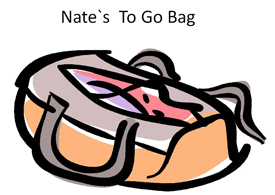
An image from “Nate’s To Go Bag” hand-out, one part of his emergency training for self-advocates.
An emergency has hit Massachusetts. Nate Trull fills his “To Go” duffle bag with a flashlight, portable radio, a change of clothes and canned food. He evacuates his home.
It’s not a real scenario, but it could be. And people with intellectual, developmental and other disabilities—who may face challenges understanding the often technical language and jargon used in local emergency alerts and warnings—need to know how to protect themselves.
That’s why Trull, a self-advocate with a developmental disability, took it upon himself to develop “Nate’s To Go Bag,” a handout that is one part of the self-advocate training program for the Emergency Preparedness and Response Initiative at theEunice Kennedy Shriver Center, a unit withinUMass Medical School’s Commonwealth Medicine division.
“He came to me and said, ‘This is a group of people you’re not thinking about in your training,’ ” said Sue Wolf-Fordham, JD, the project manager in charge of the Shriver Center initiative that promotes equitable and efficient emergency planning and response for people with disabilities. “He saw the need and created something to fill that need.”
Trull, a consultant for the Shriver Center for the past five plus years, worked with Shriver Center staff to create the handout that breaks down, step by step, what someone should bring with them if they leave their home during an emergency. Focusing on pictures rather than words, the handout is one of several from Trull’s interactive workshop, Getting Ready for Emergencies.
“It’s an open discussion,” Trull said, explaining that his workshops often include clarifying the meanings of phrases or words used in emergency situations.
The handout was distributed at an Oct. 17 mini-conference, Emergency Smarts, being held at the Cardinal Cushing Centers in Hanover. Organized by the Shriver Center, the conference was funded by the state Department of Developmental Services.
“We hope this mini-conference can serve as a model for similar presentations to be given in other parts of the state and to a broad range of people with disabilities,” Wolf-Fordham said of the conference, which also included a social media safety presentation, Trull’s Getting Ready for Emergencies presentation and a hands-on activity Trull developed to reinforce the concepts taught.
A former Boy Scout who hosts the The Nate Dog DJ Hour at Bristol Community College, where he is a part-time student majoring in psychology, Trull said he enjoys his work because he considers himself a caring person. “I want to help people,” said Trull, who also founded and operates a self-advocacy group, Powerhouse, on the South Coast of Massachusetts.
Trull’s programs have received positive feedback, which is no surprise to Wolf-Fordham. “What Nate brings is the authenticity of a self-advocate,” she said. “Having watched him in action I can see what he’s saying resonates with the audience.”